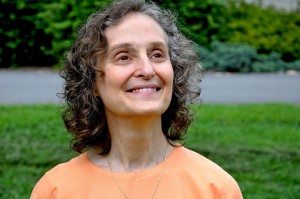 In this monthly series on the Yamas and Niyamas, Swami Karunananda offers wisdom and reflections on applying these foundational principles of Yoga in daily life. This month’s teaching is on Satya, truthfulness.
In this monthly series on the Yamas and Niyamas, Swami Karunananda offers wisdom and reflections on applying these foundational principles of Yoga in daily life. This month’s teaching is on Satya, truthfulness.
Sutra 2.36: To one established in truthfulness, actions and their results become subservient. —from The Yoga Sutras of Patanjali
In other words, first, you obey truth. Then, after some time, your words become so pure and powerful that what you say will come to pass.
FROM THE WISDOM OF SRI SWAMI SATCHIDANANDA:
“A word is a bird. Once you let it out of the cage, you can’t whistle it back.” Saying you are sorry can’t take it back; a subtle trace remains in the mind.
We have two ears always open, so we should always be open, listening, and learning from others. In contrast, we have only one tongue, which is well protected with: a soft gate (lips), an ivory fortress (teeth), and a moat. So, we should think thrice before speaking. Our very anatomy gives this message.
If we can control the tongue, we can control everything and attain self-mastery. We have five organs of perception (eyes/sight, ears/hearing, nose/smell, tongue/taste, sense receptors/touch) and five organs of action (hands, feet, organ of procreation, organ of elimination, and the tongue as the organ of speech). Only the tongue is both an organ of sense and an organ of action. Thus, it plays a pivotal role in our life.
FROM THE TIRUKKURAL (South Indian scripture often quoted by Swami Satchidananda):
“Whatever you may fail to guard, guard well your tongue; for flawed speech unfailingly invokes anguish and affliction.”
“The wound caused by fire heals in time; the burn inflicted by an inflamed tongue never heals.”
“Truthfulness is saying that which has not the least bit of evil in it. Falsehood, too, will be ranked as truthfulness if it produces flawless good — benefit to someone and harm to no one.”
This third quote is illustrated by the story of a young woman who seeks refuge in a hermit’s hut when chased by a man who wants to steal her jewels. She runs into the hut and hides there right before the would-be thief arrives. When questioned by the thief who is wielding a large knife, the hermit might deny seeing the woman or tell the thief she ran off in another direction.
By responding in this way, the hermit saves three lives: the woman’s, his own as the thief wouldn’t have left him as a witness, and the thief’s as well, who would eventually be caught and punished for his crimes. So, the action of the hermit brought benefit to others and prevented harm from occurring.
FROM THE BHAGAVAD GITA:
“Speech which is non-harmful (non-agitating), truthful, pleasant and beneficial, plus the study of scripture, constitute discipline in speech.”
SUGGESTION FOR PRACTICE:
According to the yogic teachings, speech should meet the four qualifications described above: non-harmful, truthful, pleasant and beneficial. If it doesn’t meet these criteria, we can try to rephrase it or not say it.
Over a month, focus on one quality per week, and then try to observe all four the fifth week. Since speech is a main way we interact with others, we can learn a lot about ourselves, our relationships, and about communication in general by observing and adjusting our speech.
About the Author:
 Swami Karunananda is a senior disciple of Sri Swami Satchidananda. In 1975, she was ordained as a monk into the Holy Order of Sannyas. She has had almost 50 years experience teaching all aspects of Yoga and specializes now in workshops, retreats, and teacher training programs that focus on the science of meditation, the philosophy of Yoga, personal transformation, and Yoga breathing techniques for better health and well-being. She developed, and for 30 years has taught, the Integral Yoga Teacher Training programs in Raja Yoga and in Meditation.
Swami Karunananda is a senior disciple of Sri Swami Satchidananda. In 1975, she was ordained as a monk into the Holy Order of Sannyas. She has had almost 50 years experience teaching all aspects of Yoga and specializes now in workshops, retreats, and teacher training programs that focus on the science of meditation, the philosophy of Yoga, personal transformation, and Yoga breathing techniques for better health and well-being. She developed, and for 30 years has taught, the Integral Yoga Teacher Training programs in Raja Yoga and in Meditation.
Swami Karunananda served as president of Satchidananda Ashram–Yogaville in Virginia and in California, as well as director of the Integral Yoga Institutes in San Francisco and in Santa Barbara. She currently serves on the Board of Trustees, and as the chairperson of the Spiritual Life Board at Satchidananda Ashram–Yogaville, Virginia.
Interested in fostering interfaith understanding and harmony, she is featured in the interfaith documentary entitled, With One Voice. She also compiled and edited the Lotus Prayer Book, a collection of prayers from various faith traditions, and Enlightening Tales as told by Sri Swami Satchidananda. She served as contributing editor for The Breath of Life: Integral Yoga Pranayama, as well as a senior writer for the Integral Yoga Magazine. In her book, Awakening: Aspiration to Realization Through Integral Yoga, she describes the spiritual path and provides guidance for the journey.


